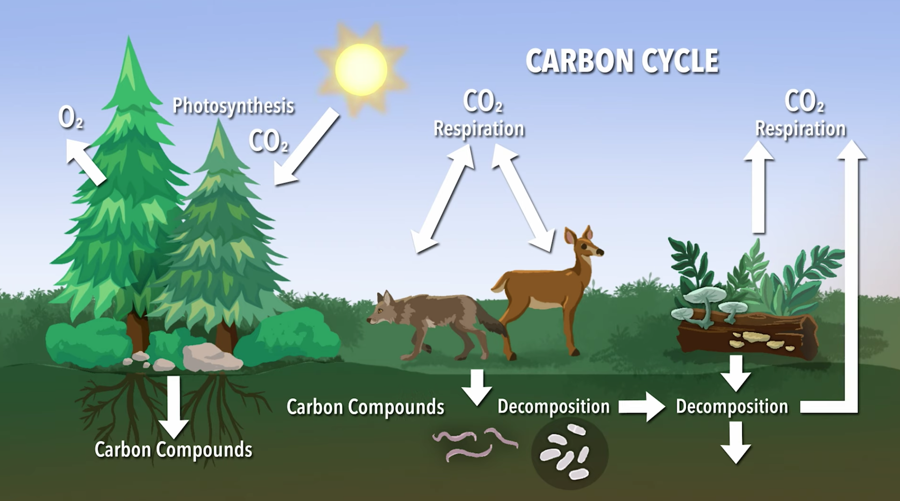“In nature,” environmental educator Khari Diop explains, “composting occurs when plants, animals, and all of their byproducts decompose into the Earth as part of the carbon cycle.” In this Let’s Go Enviro Solutions to Food Waste video lesson from Georgia Public Broadcasting (GPB) Education, Diop talks with Cecil Washington, Jr. about food waste, compost chemistry, and how we can improve the impact of human activities on the environment.
“All of the nutrients are cycled back into the Earth through decomposers and microbial communities into soil, like worms, fungi, and bacteria.”
“Composting provides the ideal conditions for these microorganisms to thrive, enabling them to turn organic matter into a highly nutrient-rich soil amendment that can help crops, garden plants, and trees grow. It creates new soil from which more plants can grow, from which animals and humans will eat, and so on and so forth…
“It all comes full circle, so when composting at home or on a farm like this one, we can actually control the elements to help promote healthy decomposition.”
At Atlanta, Georgia‘s Truly Living Well Center for Natural Urban Agriculture, Diop and his team speed up that composting process, and involve students in the program. They also educate the community about soil health, the benefits of recycling organic materials, and how food waste impacts the climate.
Food waste thrown in landfills doesn’t decompose naturally or return to the Earth as beneficial nutrients because it lacks the proper conditions. Instead, it rots and produces methane, “a greenhouse gas 25 times as potent as CO2 at trapping heat in the atmosphere.”
“EPA estimates that wasted food is responsible for 58% of landfill methane emissions to the atmosphere.”
Diop and the farm’s Compost Connectors are dedicated to the solutions that mitigate this harm, and are actively restoring the community’s soil ecosystems in the process. Find the lesson’s support materials here.
Plus, a series summary from GPB Education:
“Let’s Go Enviro is a digital video series that teaches environmental science through phenomena, project-based learning, and Georgia’s diverse ecosystems. The video library consists of six units. Units 1-5 include videos that invite students to become environmental stewards in their own communities, while Unit 6 introduces students to a wide range of careers in the industry. All videos are aligned to the Georgia Standards of Excellence for high school environmental science.
“Each unit includes teacher and student support materials and resources that can be used in the classroom.”
• Unit 1: Flow of Energy and Cycling of Matter
• Unit 2: Stability and Change in Ecosystems
• Unit 3: Sustainability of Energy Resources
• Unit 4: Human Impact on Natural Resources
• Unit 5: Sustainable Infrastructures
• Unit 6: Careers in Environmental Science
Related reading: Compost: Your Trash, Nature’s Treasure! from the American Chemical Society.
Watch these videos next on TKSST:
• The Secret History of Dirt, a smart soil explainer
• Vermicomposting: How worms can reduce our waste
• Worm Bin: 100-day time-lapse
• Powered by Poop at the Straus Family Creamery
• Fish Poo Strawberries: How can aquaponics sustainably grow plants and fish?
• The Farm Next Door, a peek at urban farming in Atlanta
Curated, kid-friendly, independently-published. Support this mission by becoming a sustaining member today.






